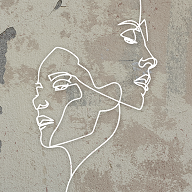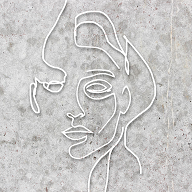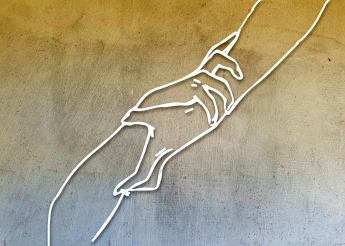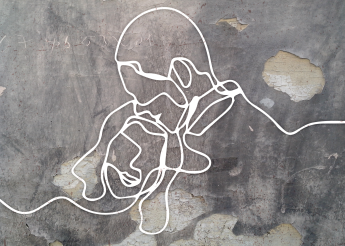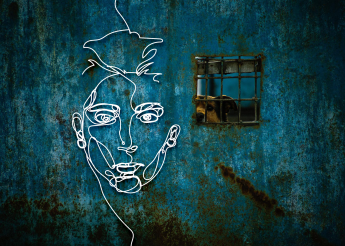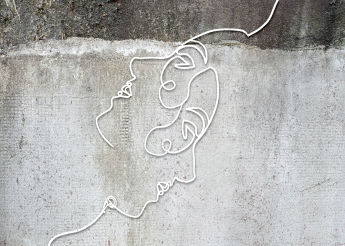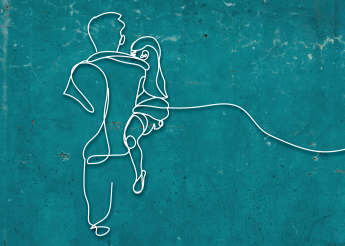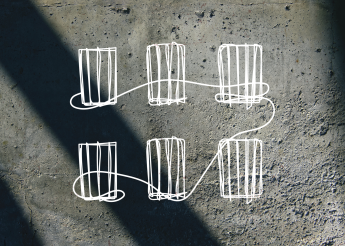
Every prisoner has the right to respect for their private and family life: to call their children, to see their parents in the visitation area, to write to their friends, to visit their hospitalised grandparent, etc. Prison authorities are required to implement the provisions necessary for maintaining these ties. However, this is often seen more as a means than an end: its status as a basic human right has been erased, and instead the prison service has assigned it a role in reintegration. What are the consequences for prisoners and for their loved ones?
Prison Insider explores the challenges of maintaining ties from prison. Outward Bond brings together the stories and experiences of people who have been imprisoned and those who supported them in Belgium, Canada and France.
— Outward Bond benefitted from the support of the Paris Bar Association, the Lyon Bar Association and the City of Lyon.
Letters are less painful. He can think about what to say. And no one is asking him any questions. It gives him more freedom.
For men, relationships are a source of support. For women, it is a responsibility towards their children.
Prisoners without solid ties are at a higher risk of ending up on the streets or in shelters upon their release.
The return to family life is not always smooth sailing.
Relatives cannot and should not ever be solely responsible for reintegration.
Contributions
Prison Insider promotes a collaborative approach to information: the stories and experiences of people who have been imprisoned and those who supported them are gathered in this paper, with no claim to exhaustiveness1. The following people contributed to this work:
Adel* (former prisoner, France), Paula Akyol (Project Manager at Children of Prisoners Europe, Europe), Ariane Amado (researcher at Université Libre de Bruxelles, Belgium), Daniel Bellemare (Executive Director of Maison Radisson, Canada), Henri Bouchet (Director of Relais Enfants Parents Incarcérés de Nantes, France), Camille (former prisoner, France), Charlotte Camard (coordinator of the Pôle Accompagnement at the Association Possible, France), Lydie Chaudet (recidivism prevention advisor at CAPSO, France), Amélie Couvrette (researcher at the International Centre for Comparative Criminology, Canada), Mathias Dambuyant (sociologist, France), Marie-Sophie Devresse (researcher at the Centre de Recherche Interdisciplinaire sur la Déviance et la Pénalité, Belgium), Marie-Nathalie d’Hoop (Deputy Managing Director of the Service Général Justice et Justiciable of the Administration générale des Maisons de Justice, Wallonia-Brussels Federation), Samira Figuigui (Executive Director of the John Howard Society of Quebec, Canada), Franck (former prisoner, France), Ruth Gagnon (Executive Director of the Elizabeth Fry Society of Quebec, Canada), Anne-Céline Genevois (Program and Development Coordinator at the Elizabeth Fry Society of Quebec, Canada), Alain Grosjean (President of the Plate-Forme Sortants de Prison, member of the Monitoring Commission for Lantin Prison, Belgium), Grégoire* (former prisoner, France), David Henry (Executive Director of the Association des services de réhabilitation sociale du Québec, Canada), Maurice Jansen (Director of the Relais Enfants-Parents, Belgium), Laurence Libert (coordinator at Résilience, Belgium), Philippe Massay (Director of the Partnership board for the Administration générale des Maisons de Justice, Wallonia-Brussels Federation), Sophie Maury (Managing Director of Relais Famille, Canada), Salima Mokkadem (Head of Department at the CHRS Les Augustins in Amiens, France) and her team, Anne-Laure Ndiaye (recidivism prevention advisor at CAPSO, France), Olivia* (friend of a prisoner in Quebec, Canada), Franck Ollivon (Director of Studies in the Geography department of the École Normale Supérieure, France), Pierre-Jean Petit (Executive Director of L’Îlot, France), Jonathan Peromet (Director of the Electronic Monitoring board of the Administration générale des Maisons de Justice, Wallonia-Brussels Federation), Manu Pintelon (Belgian coordinator for RESCALED, Belgium), Jonathan Péromet (Director of the Electronic Monitoring board, Wallonia-Brussels Federation), Ryan* (former prisoner, France), Antoine Schuller (criminologist and social worker at La Touline, Belgium), Audrey Servais (attaché at the Administration générale des Maisons de Justice, Wallonia-Brussels Federation), Maïven Socquet (psychologist in the prisoner assistance department at the Service Marchois d’aide aux Justiciables, Belgium), Solange* et François* (parents of a former prisoner in Quebec, Canada), Ashling Tobin (project coordinator of the “Children & Families Initiative” at the Irish Penal Reform Trust, Ireland), Marine Tocco (Head of Department at Les Foyers Matter, France), Caroline Touraut (sociologist, France), Véronique (partner of a prisoner in Quebec, Canada).
This thematic paper does not address the particular cases of sex offenders and perpetrators of domestic violence. ↩
